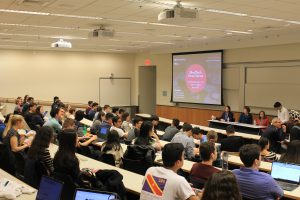
by Sophie Burkholder
Given the closing of schools in response to the coronavirus pandemic, professors teaching lab-based courses were forced to make some changes. One such course, the Department of Bioengineering’s Medical Device Development (BE 472) taught by Matthew R. Maltese, Ph.D., usually requires students to develop a medical device and learn how to lead a startup venture for it. Over the semester, students design prototypes for unmet needs in the medical device community, and then go on to learn about business-related aspects of the project, like fundraising, regulations, teamwork, and leadership. Maltese often encourages junior engineering students to take the course, in the hopes that their projects might become launchpads for their senior design projects the following year.
But with the pandemic’s interruptions to education restricting access to the lab, or even to some of the schematics for their earlier designs, Maltese’s Spring 2020 students had to re-focus on the business side of their projects.
Fortunately, the shift to online learning came late enough in the semester that most students had already come up with solid project ideas. Maltese then shifted gears to the less hands-on parts of the course. “There’s lots of elements to this course that are not focused on putting hands on hardware,” he says. “They’re focused on distilling and disseminating information about your endeavor to people that are interested.”
While some of those more hands-off assignments originally had some face-to-face aspects, like the final pitch competition, they’re also easy to transition to an online format. Maltese had students record videos of their pitches, which he notes is perhaps more akin to what they might have to do for external pitch competitions. And even though students couldn’t make their physical prototypes, Maltese says that they were all able to make virtual prototypes through CAD or other modeling software.
In his opinion, this renewed focus on out-of-lab prototype models might be a good thing for real-world experience. Investors and stakeholders often want the full picture of a device or startup before they even have to start working with physical material, for the sake of cost efficiency.
Students had already been working on their projects for a couple of months before the pandemic started to affect classes, so most of them stuck to their original ideas instead of adapting them to meet the needs of the current medical crisis. “Next year, I think we’re going to focus the class on COVID-19 ideas though,” says Maltese.
In fact, Medical Device Development will likely be one of many Penn Bioengineering courses that adapts its curriculum to the challenges the pandemic presented. “As a medical device community, a pharmaceutical community, a healthcare community, we were not ready for this,” Maltese notes, “but history teaches us that some of our greatest innovations emerge from our greatest trials.” He is excited for the future.
